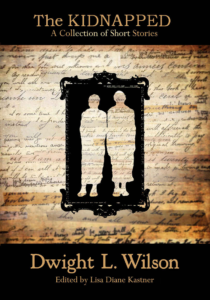The Kidnapped: A Collection of Short Stories
Reviewed by Jim Hood
October 1, 2019
 By Dwight L. Wilson. Running Wild Press, 2018. 182 pages. $16.99/paperback; $7.99/eBook.
By Dwight L. Wilson. Running Wild Press, 2018. 182 pages. $16.99/paperback; $7.99/eBook.
Buy from QuakerBooks
“My name is Sarah Ferguson. I was born in slavery but, with the help of the Underground Railroad, stole myself and fled to Ohio.” So begins the introduction to Friend Dwight L. Wilson’s collection of short historical fiction based on the life and experiences of his fourth great-grandmother and other ancestors. As a group, the stories in this collection imagine a varied series of happenings in the pre-Civil War United States centered on an extended African, Quaker, and Indigenous family and their friends, including acts of enslavement, life under slavery, escape to the North, racism in the North, kidnapping, recovery, and abolitionist resistance. They give us a nuanced, complex, and deeply personal history from the 1730s to the 1850s.
The phrase “stole myself” in Sarah’s opening words is key, for this narrator is a woman we see choosing her own path into mental and bodily independence. Despite the multiple restrictions, legal and cultural, that bind her in the United States where slavery was still legal, Sarah herself is becoming unbound, and Wilson gives readers the gift of watching as her life unfolds in new ways. She moves from the background into the foreground, and we feel keenly the multiple complexities of the historical situation through which this movement occurs.
These stories do not hold back on uncovering the absolute cruelty and crushing terrorism of the enslavement system, so readers should not expect in Wilson’s collection a narrative of easy triumph. The stories provide a full picture of slavery’s reach and, especially, Quaker engagement with it in the antebellum United States. Through its blending of historical (both the author’s actual ancestors and other historical personages) and fictional characters, these stories cover everything from a Quaker slave holder in Virginia separating children from their parents for the sake of keeping his land to a fervent and wealthy abolitionist named Patience Starbuck who organizes anti-slavery conventions. There is an enslaved man who joins a group of Shawnee after a raid on the plantation where he has been forced to labor. There are Africans who want to assimilate in the United States and those who hold on to their Fante language and heritage. There are Quakers who provide safe houses along the Underground Railroad and a descendant of Quakers who is a slave holder and a rapist. One of the supporting characters who appears in a couple of stories is an ex-slave himself who betrays others by assisting a White slave hunter from Kentucky in kidnapping those who have escaped over the river into Ohio. Wilson peoples his narrative with all sorts, as Sarah says of the stories: “Each of the privileged is not an oppressive actor. Each of those of color is not heroic. Survivors, not victims are the foci. Regardless of circumstances, optimism fuels decisions.”
These stories do not mince matters. The plainness of their approach to the historical period marks them as Quaker as much as does their focus on Quaker characters. Various characters speak very plainly, as when the fictional abolitionist Patience Starbuck greets the historical Angelina Grimké in one story about women organizing an abolitionist meeting. When Grimké asks politely, “Does Ohio always have snow this late in the spring?” Starbuck returns the nicety with, “Dear Angelina, the only thing we always have is racial hatred.” When the fictional British Friend Margery Barclay, meeting with these abolitionist women in Ohio, broaches the subject of American Quaker discomfort with Blacks joining their meetings, she says, “I am told that the colored people of America prefer singing and preaching.” Sarah Mapps Douglass (another historical figure) retorts, “We ‘prefer’ justice . . . especially when it flows from those who profess to embrace it.” And in one story set in Tennessee, Tiana Rogers, the Cherokee wife of Sam Houston, says, “Honesty does not settle all things. . . . Integrity includes more than what comes from the mouth.”
Friends will find in these stories a rich and sometimes startling tapestry of courageous resistance, violence against those struggling for justice, and excellent food for thought. (Here, again, is Patience Starbuck: “Slavery is always lack of peace, which is to say, it is war.”) While I, as a novel lover, might wish for a bit more narrative to interlock the stories, there is much to gather from this collection, especially for those Friends who wish to face squarely the complex interplay between our own religious tradition and the institution of White supremacy upon which the United States was founded and has continued to sustain itself.



Comments on Friendsjournal.org may be used in the Forum of the print magazine and may be edited for length and clarity.